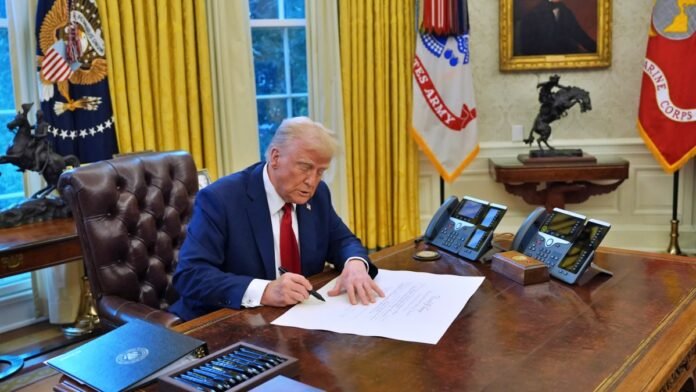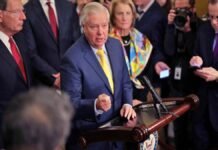
Key Points:
- President Donald Trump announced the launch of a $5 million “Gold Card,” offering U.S. residency and a pathway to citizenship for wealthy individuals.
- The program will replace the EB-5 investor visa, eliminating job creation requirements in favor of a direct purchase model.
- The initiative aims to attract affluent global citizens, generate billions in revenue, and reduce the national deficit.
- Critics argue it prioritizes wealth over merit and could impact skilled immigrants stuck in green card backlogs.
Washington D.C: In a bold move to reshape U.S. immigration policy, President Donald Trump announced on Tuesday the introduction of a “Gold Card” visa program. This premium alternative to the traditional Green Card will allow affluent foreigners to secure permanent residency and a pathway to citizenship for a $5 million fee. Trump described the initiative as “green card privileges plus” during his Oval Office announcement.
“We’re going to be selling a gold card,” Trump stated. “Wealthy people will come into our country by purchasing this card. They’ll be successful, spend money, pay taxes, and employ people. It’s going to be extremely successful.”
The program is set to launch in two weeks, with Trump suggesting that millions of cards could potentially be sold. Commerce Secretary Howard Lutnick confirmed that the Gold Card would replace the EB-5 investor visa program, which has been criticized for inefficiencies and fraud.
How the Gold Card Differs from the EB-5 Visa
The existing EB-5 visa program requires foreign investors to invest between $800,000 and $1.05 million in U.S. businesses that create at least 10 jobs. The Gold Card eliminates this job creation requirement, allowing applicants to directly purchase residency for $5 million.
Lutnick emphasized that applicants would undergo vetting to ensure they are “world-class global citizens.” Unlike EB-5 funds, which are directed toward private projects, revenue from Gold Cards will go directly to the U.S. government, potentially generating billions in funds for deficit reduction.
Potential Impact on Immigration Policy
The Gold Card represents a significant shift toward wealth-based immigration. Trump argued that this approach would attract high-net-worth individuals who contribute significantly to the economy through taxes and investments. However, critics have raised concerns about fairness and accessibility.
Indian nationals, who make up a large portion of those stuck in green card backlogs some waiting over 50 years may find their options limited under this new model. Ajay Bhutoria, an advocate for immigration reform, criticized the move: “This prioritizes wealth over merit and ignores skilled professionals who have contributed immensely to the U.S. economy.”
Revenue Generation and Economic Goals
Trump highlighted the financial benefits of the Gold Card program, suggesting it could help pay down the national debt. He speculated that one million cards could be sold globally, generating $5 trillion in revenue.
“This is not just about immigration; it’s about strengthening our economy,” Lutnick added. “We’re inviting successful individuals who will invest in America while helping us reduce our deficit.”
Criticism and Controversy
The announcement has sparked debate over its implications for U.S. immigration policy. Critics argue that replacing EB-5 with a pay-to-reside model undermines principles of merit-based immigration while favoring ultra-wealthy individuals over skilled workers.
Additionally, questions remain about implementation details. Trump claimed congressional approval was unnecessary but did not elaborate on how the program would be legally executed.
When asked whether Russian oligarchs could qualify for Gold Cards, Trump replied lightheartedly: “Yeah, possibly. I know some Russian oligarchs who are very nice people.”
Global Context: Following the ‘Golden Visa’ Trend
The Gold Card aligns with global trends in wealth-based immigration programs, often referred to as “golden visas.” Countries like Canada, Australia, Spain, and Malta offer similar schemes targeting affluent investors.
Henley & Partners, an advisory firm specializing in investment migration, noted that such programs attract high-net-worth individuals seeking residency or citizenship benefits while boosting local economies.
A Game-Changer or a Step Backward?
As Trump prepares to roll out this controversial initiative, its long-term impact on U.S. immigration remains uncertain. While it promises significant economic gains and attracts global elites, critics warn it may deepen inequalities within an already complex immigration system.


















































